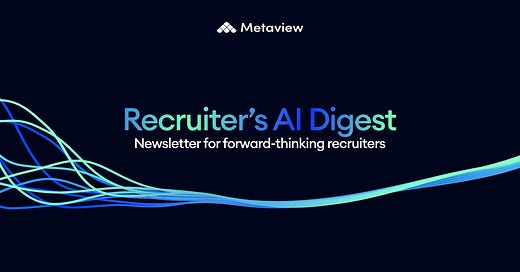Recruiter's AI Digest #70
Resources and perspectives to keep you ahead of the curve as AI deepens its impact in Recruiting. 🤖
Welcome to the community of 3,500 forward-thinking recruiting leaders. 🎉 We stay on the pulse of AI and its impact on recruiting, so you don’t have to!
If you haven’t already, don’t forget to subscribe to this newsletter.
This week’s digest
Recruiting jobs at companies that give their recruiters superpowers https://www.metaview.ai/customers/open-roles
Check out the awesome material this week 📖 :
Top 5 HR Trends and Priorities for 2025
(Gartner)The State of AI - 2024
(Air Street Capital)UK graduates face tough jobs market as AI transforms recruitment
(FT.com)AI Won't Replace Recruiters, But It Will Shake Things Up
(Open to Work Pod)
Are there people you know struggling to digest all the AI news? Share this newsletter with them. 🙏
Top 5 HR Trends and Priorities for 2025
(Gartner)
Here we’ve pulled out some of the key AI trends from Gartner’s report:
AI's Productivity Paradox: While 47% of employees using AI expect it to boost productivity, the reality is quite different. A staggering 77% report AI tools have added to their workload rather than streamlining it, highlighting the gap between AI aspirations and deployment realities. This is a critical signal for HR leaders to rethink how AI is integrated into workflows.
Generative AI Hype: CEOs and business leaders expect a 23% improvement in productivity over the next 12-18 months from generative AI, but success hinges on solving adoption and training challenges. Most HR tech investments are stuck chasing marginal efficiency gains without transforming business value.
Mismatched Skills & AI: Industry transformations driven by AI are expected to change 23% of jobs over the next five years. HR must align workforce planning with AI-driven shifts to ensure the right skills are nurtured or sourced in time, avoiding the looming talent shortage.
AI Use Cases in HR: The report highlights three prime AI opportunities—employee-facing chatbots, automated document generation, and job description/skills data optimization. These areas show immediate promise in creating tangible impacts on HR processes, offering an exciting space for recruiters to tap into.
HR Tech Misalignment: Despite the AI buzz, 55% of HR leaders admit their current tech stack isn’t future-proof. Only 25% of HR teams think strategically about how technology, including AI, can truly transform their roles. This underscores the need for a shift from "capacity-first" to "impact-first" HR tech strategies.
Check it out here.
The State of AI - 2024
(Air Street Capital)
Generative AI's Massive Impact: Generative AI continues to transform industries, with companies like OpenAI, Meta, and Anthropic leading the way. Notably, OpenAI's models like o1 are achieving new heights in reasoning-heavy tasks, yet at a steep cost, making AI integration expensive for many businesses.
AI Challenges in Deployment: Despite the hype, many AI tools, especially in enterprise, are struggling with practical deployment issues. Researchers continue to debate whether the rapid progress seen in model capabilities (such as in coding and math) might be inflated due to dataset contamination, raising questions about the true robustness of AI models.
NVIDIA’s Dominance: NVIDIA remains the king of AI hardware, driving much of the progress. With companies like Meta, OpenAI, and Tesla relying heavily on NVIDIA’s H100 GPUs, the company’s market cap surged to $3 trillion. However, new challengers, like Cerebras and Groq, are entering the AI chip arena with a focus on speed and performance, potentially offering alternatives.
AI in Hiring: AI-driven tools like speech recognition and generative image/video capabilities are growing rapidly in recruitment, helping automate processes like candidate screening and onboarding.
AI Agents Rise: AI agents are becoming more powerful, taking on complex tasks autonomously. Start-ups like Devin are pioneering the use of AI software engineers, making headway in automating workflows—an exciting development for recruiters looking for cutting-edge talent.
Read it here.
UK graduates face tough jobs market as AI transforms recruitment
(FT.com)
Surge in Applications Due to AI:
Employers received an average of 140 applications per graduate role in 2024—a 59% increase from 2023.
AI tools make it easier for graduates to apply quickly, but this has led to a drop in application quality and more rejections.
Sector-Specific Hiring Declines:
Graduate hiring in IT is down by 35%, with consulting and other high-paying sectors also seeing drops.
Overall, vacancies at large companies only grew by 4%, compared to 6% the previous year.
Intensified Competition:
With smaller companies pulling back on graduate hiring, more students are vying for fewer positions at larger firms.
London, which accounts for nearly a third of graduate roles, saw a 22% decline in job postings.
Increased Pressure on Graduates:
Graduates are now submitting an average of 50 applications, compared to just 15-20 in previous years.
AI tools are helping manage the workload but often lack the personal touch needed to secure a job.
Employers Adjusting Requirements:
Fewer employers are requiring a 2:1 degree as a minimum qualification, opening doors to more candidates but leading to more rejections.
Read the article here.
AI Won't Replace Recruiters, But It Will Shake Things Up
(Open to Work Pod)
From the sponsor
Metaview: The world’s #1 AI scribe for recruiting
Metaview uses AI to automatically write your interview, debrief and intake notes for you.
Our summaries are purpose-built for recruiting, so they’re 10x more accurate and relevant than generic transcription tools. And, they work seamlessly with your existing recruiting stack, video conferencing tools, and even mobile calls, so there’s no need to change your existing workflows.




